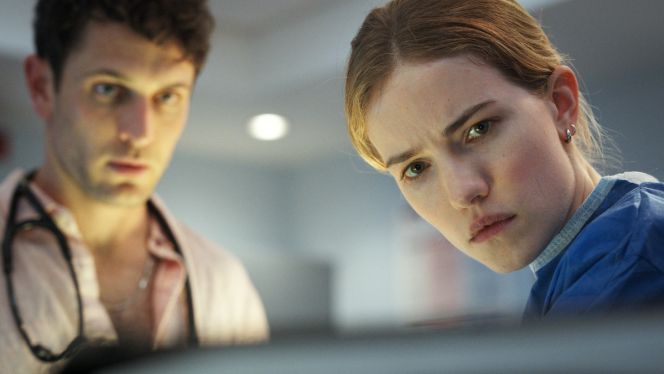SERIES REVIEW – From its very first frame, Pulse gives the impression that most of its creative energy went out for coffee and never came back. The Netflix medical drama kicks off with a hurricane forcing a bus full of student athletes off a bridge into the ocean. The scene looks less like prestige television and more like a rejected cutscene from a 2012 video game: a bus-shaped polygon drops into still water while cartoonish storm clouds roll in behind it.
If Pulse were even remotely interested in exploring its doctors as real people — both on and off the job — this crash could have served as a gripping setup, showcasing how a hospital team rallies to handle a mass-casualty emergency. But instead of raw emotion and grounded tension, we get blockbuster theatrics with zero payoff. Forget gritty realism; just let the drenched and panicked patients flood into the ER, and let the characters reveal themselves through how they respond. Instead, we’re stuck watching pixels crash and character arcs sink.
Allegations, Attractions, and the Emotional Void
But that’s not the story Pulse wants to tell. The bus crash turns out to be nothing more than a flashy backdrop for its real drama: third-year resident Danny Simms (Willa Fitzgerald) has accused her supervising resident, Xander Phillips (Colin Woodell), of sexual harassment. Xander is suspended, and Danny is immediately bumped up to take his position. Suspicious much? It’s hard not to raise an eyebrow when someone levels an accusation and instantly benefits from it. From here, the show dives into an extended series of flashbacks, chronicling what was clearly a consensual relationship. Shower scenes, steamy looks — not exactly hostile workplace behavior. So what changed? What took them from sizzling chemistry to an HR complaint? And is Xander really the villain of the piece, or just a tragically handsome guy who got caught up in something messy?
The whole situation mostly reminds you of better shows. Most obviously, Pulse wants to be Grey’s Anatomy: the scrubs, the stairwell sobbing, the tangled love affairs — it’s all there. But while Grey’s has been many things over its two decades, it’s rarely been this lifeless or this lazily assembled. Even when Grey’s misfires, it usually finds its way back with some kind of emotional hook. Pulse doesn’t even try to find one. It just kind of… pulses faintly, then fades.
All Style, No Substance, and Definitely No Urgency
To make matters worse, Pulse hit the scene right in the middle of The Pitt frenzy. Not that there would’ve ever been a good time for this show to premiere — but this was certainly the worst. While The Pitt exudes precision and grounded intensity, Pulse feels like it was shot on the set of a fashion shoot. The lighting is glamorous, the actors are gorgeous, and the tension is nonexistent. You’d think they were waiting for room service instead of triaging during a hurricane-induced power outage.
The characters? They’re walking tropes. Sam Elijah (Jessie T. Usher), whose name sounds like a failed screenwriter’s brainstorm session, spends most of his time pining after Danny. Tom Cole (Jack Bannon) is the obligatory jerk, included mainly to make Xander seem like less of a jerk. Camila Perez (Daniela Nieves) is bubbly and bright, Sophie Chan (Chelsea Muirhead) is her sarcastic, less-made-up foil. And then there’s Danny’s sister, Harper (Jessy Yates), a fellow resident who uses a wheelchair. In theory, she should be a central, complex figure. In practice, she’s relegated to the sidelines, only interacting with Danny and rarely stepping out from the shadow of her labels: “Danny’s sister” and “the one in the wheelchair.” Depth? Not even a shallow end here.
Pulse offers so little that even hinting at the season’s resolution feels like spoiling the only thing it has to offer. Let’s just say: by the finale, Danny’s harassment claim turns out to be more complicated than it first appeared, and she’s forced to reevaluate her life, her job, and her past relationship. Which, thank goodness. Imagine if this were just another black-and-white harassment story? Imagine if the show had the courage to explore how people — even well-intentioned ones — can screw up? That kind of narrative would require Pulse to treat Danny with actual emotional nuance, not just as a walking trauma checklist with daddy issues and an inexplicable fear of pregnant women. It would also require Xander to be more than a sad, wealthy boy doing his best. But that would be a different series altogether — one that asks real questions and doesn’t hide behind soft lighting and hospital corridors.
The One Beat Worth Saving
If there’s a single bright spot here, it’s Nestor Carbonell and Justina Machado. They play two seasoned physicians, and every time they’re on screen, you’re reminded of the better show this could have been. One where veteran doctors face real-world problems rooted in the cultural and logistical chaos of a Florida hospital. A show that acknowledges its setting, embraces bilingualism, and lets patient care reflect actual community needs. That show doesn’t exist — at least not here. Instead, Pulse is a blender full of better ideas from better dramas, pureed into narrative mush. The result is a season where people shout about central lines and intubations in designer scrubs, while a single woman’s baseless anxieties masquerade as emotional stakes.
– Gergely Herpai “BadSector” –
Pulse
Direction - 3.8
Actors - 3.2
Story - 3.1
Visuals/Music/Sounds - 3.6
Ambience - 3.8
3.5
BAD
Pulse is a frustratingly hollow medical drama that stitches together tropes from better shows without understanding what made them work. Its characters are paper-thin, its plot collapses under its own weight, and the only glimmer of life comes from two underused supporting actors. If this show has a pulse, it’s weak — and fading fast.


















Leave a Reply